How to stop robocalls: 9 steps to secure your phone and avoid scams
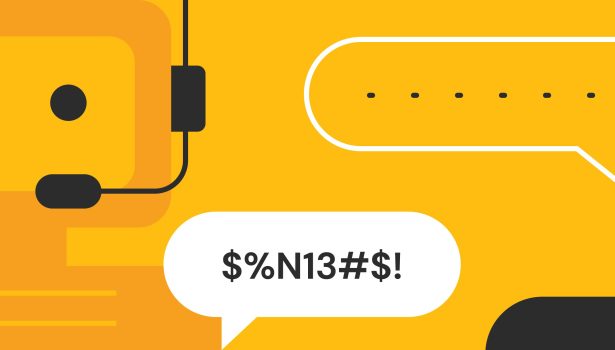
Modern security measures, like two-factor authentication, have turned your cellphone into a skeleton key – if a scammer can access your phone, they can access just about any of your other accounts too. So, though your phone is your first line of defense against privacy invasion, it’s also a really big target.
While it’s common to see spam calls and texts as little more than a nuisance, if you’re receiving a constant barrage of spam, then you’re currently being targeted by someone, somewhere. Simply interacting with these messages, even if they’re seemingly harmless, could open the gates to a much bigger problem.
That’s why we’ve created this guide. You shouldn’t live with the hassle of spam, and you certainly shouldn’t put up with the constant security vulnerability it presents. We’re going to give you actionable advice on how to stop robocalls on your phone and protect your privacy.
Robocalls are not considered illegal per se and permissible uses include political candidates and charitable organizations asking for donations, basic information calls like appointment confirmations and cancellations, notifications about upcoming elections, flight confirmations, emergency alerts like weather warnings, and calls from entities you’ve done business with.
To protect yourself from unsolicited robocalls, spam, and scammers, remove your phone number from people-search sites and social media, utilize robocall blocking services provided by your phone carrier and protection settings in your devices, use call-blocking third-party apps, sign up for the Do Not Call Registry, and never pick up unsolicited calls in general.
The types of robocalls
Before we talk about how to stop robocalls and spam, let’s take a moment to get our definitions straight. Robocalls (which refer to calls with pre-recorded messages) aren’t inherently illegal. Despite the Federal Trade Commission (FTC) raising the alarm on a constant stream of illegal robocalls, there are permissible (and even helpful) types of calls too. This leads a lot of people to a tricky question: how do I know if a robocall is a scam? The answer is clearer than you think. Here’s what you need to know. The only circumstance in which callers can send you unsolicited recorded messages (robocalls) is if they’re:
- Charitable and political organizations: Political candidates and charitable organizations asking for donations can make robocalls.
- Public service announcements and emergency alerts: weather warnings, public health notifications, and any other calls that provide important or time-sensitive information.
- Entities you’ve done business with: If you’ve made an appointment at an auto repair shop or the local dentist, they can use a robocall to contact you. This extends to banks, telephone carriers, and other real companies you associate with.
- Purely informational calls: Robocalls regarding basic information like appointment cancellations, prescription updates, flight confirmations, and more are all allowed. This also extends to debt collection robocalls, as long as the debt collector doesn’t try to sell services via recorded messages.
That’s it. All other robocalls can be safely assumed to be at least suspicious and at worst clear attempts at a scam. If you receive any of the following types of fraudulent calls, understand that you’re dealing with an entity that has already broken the law by contacting you (so what else are they willing to do?):
- Marketing robocalls: It is illegal to make unsolicited marketing robocalls. Unless someone has your signed permission, they cannot use recorded messages for sales calls. The fines are very steep for this behavior, so this is normally a sign of a scam rather than true marketing.
- Imposter robocalls: As the FTC reported, government imposter robocalls are very common. A government agency will never ask you to wire money, to enter your SSN, or to send you a tax return via robocall. These are scams.
- Other suspicious phone calls: There’s no shortage of creative ways scammers can use robocalls to trick you. The key to their social engineering strategy is making you concerned for your own safety or finances, such as making a fake debt collection call and asking you to verify your identity for more information. If you’re ever in doubt about a robocall, immediately hang up and locate the official number of the entity they pretended to be.
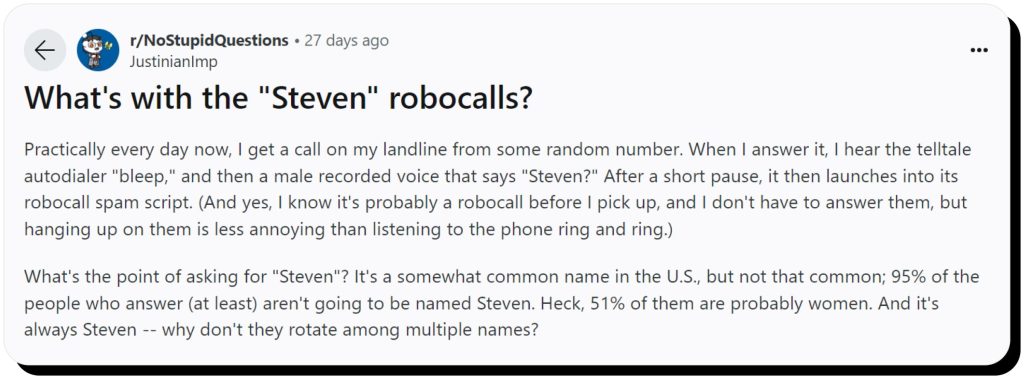
How do scammers get my phone number?
According to YouMail’s Robocall Index, in just the first eight months of 2020, nearly 4 billion robocalls have been made. While some of these prerecorded messages can be useful, such as appointment and prescription reminders, the vast majority are intrusive and illegal.
Before sharing how to stop robocalls, we’re going to see three of the most common ways scammers get your phone number in the first place:
- Your data has been sold: Now that just about every app and website requires account creation and an (often blind) agreement to terms and conditions, you never really know what you’re signing up for. Some of these services could be collecting and selling your data. While not illegal, this practice could put your sensitive information in the wrong hands. Whenever you sign up for nonessential apps or sites, avoid agreeing to terms without reading them and use throwaway email addresses and generated phone numbers (such as from Google Voice) to shield your real information.
- Random dialing: While it’s more likely that spam and scam robocalls are being made from a contacts list (typically sourced from data broker or people-search site databases), the call may have been random. These robocalls may be checking for active phone numbers. Once you interact with the call, you may experience more sophisticated scam attempts.
- People-search sites: Data brokers and people-search sites have a big part to play in just about every modern scam you can think of. There’s simply no easier way for scammers to get a huge packet of your personal information, including addresses, phone numbers, email addresses, family relations, and so much more. This information is often collected from public records, and sometimes it even includes very sensitive information, such as your Social Security number. People-search sites are notoriously difficult to remove your information from, but the Onerep team has created a solution that automates the process, as you’ll see next.
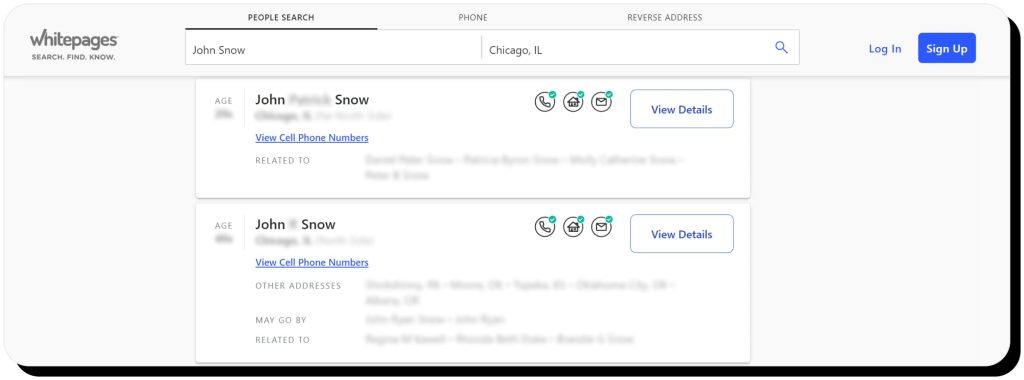
9 tips to block robocalls, scam calls, and spam calls
Now that we’ve familiarized ourselves with the danger of robocalls, let’s take a look at actionable things you can do to stop unwanted robocalls as soon as possible.
1. Remove yourself from people-search sites
This is one of the most effective ways to block robocalls. As we mentioned earlier, people-search sites essentially round up as much of your personal data as possible, create a profile of you using your name and family relations and then publish it so anyone can find it. Even seemingly innocuous information can be leveraged by scammers to gain more sensitive information. Having your phone number included on your profile is almost guaranteed since this information is so easy to find. That means anyone who takes the time to access your profile can find your phone number – and so much more.
Many scammers use programs to scrape together as many numbers from these sites as they can, and then attack them with robocalls. In this way, data brokers and people-search sites are often the first place scammers go to find your number.
Rather than visiting hundreds of people-search sites and manually completing their opt-out processes, you can use Onerep. Our online privacy tool will search the web for your data on people-search sites and then automatically complete the opt-out process to take it down. We then continuously monitor existing and new people-search sites to make sure your data doesn’t keep popping up. This is a great way to stop robocalls – by keeping your number out of scammers’ hands to begin with.
2. Choose the right carrier for your cell phone
This is a less obvious tip, but some phone companies have really robust spam and robocall blocking apps or services. We’re going to give you a really quick overview of what each major carrier has to offer below:
- Verizon: If you use Verizon Wireless, block robocalls and spam using their Call Filter service. This is a free spam screening and Caller ID service for anyone who already uses Verizon. They even display call alerts, marking incoming spam calls as “SPAM?” so you can make an informed decision before you pick up. This makes stopping robocalls much easier.
- AT&T: Much like Verizon’s Call Filter, there’s a free AT&T robocall block service called Call Protect. This is included in your wireless AT&T plan, and it blocks spam calls and helps manage unwanted calls from telemarketers. For enhanced security, there’s also a premium edition called Call Protect Plus, which includes the AT&T Mobile Security Plus service.
- T-Mobile/Sprint: This is the most robust carrier solution out there. T-Mobile (which recently merged with Sprint) uses ScamShield as their robocall block service. It gives you control over various T-Mobile anti-scam protections like Scam ID, Scam Block, and Caller ID. It even includes some really advanced security options, such as letting you change your number for free once a year and giving you a proxy number when you don’t want to give out your real number. This service is entirely free if you have an existing plan with this carrier.
3. Take advantage of device protection settings for iPhone and Android phones
Most mobile phones come with useful device protection settings and call-blocking features. While built-in features aren’t always as robust as some of the best apps to stop robocalls or phone carrier programs, they’re worth turning on for an extra layer of security. Here are the options the two major phone manufacturers offer:
- How to block robocalls on iPhone: There are a few useful features to block robocalls on iPhones. One is the “Silence Unknown Callers” option. This blocks all numbers that aren’t already saved in your contacts (so it will silence calls from people like your doctor or delivery whose numbers you just don’t have as well). You can also easily set up a third-party app to filter and detect spam calls within the “Call Blocking & Identification” settings page.
- How to block robocalls on Android: Similar to iOS, you can assign apps to block robocalls within the Android settings page. Some Android devices also let you block calls from all unknown numbers (also without differentiating legitimate callers from bots). Otherwise, you can block numbers one by one in the default Phone app.
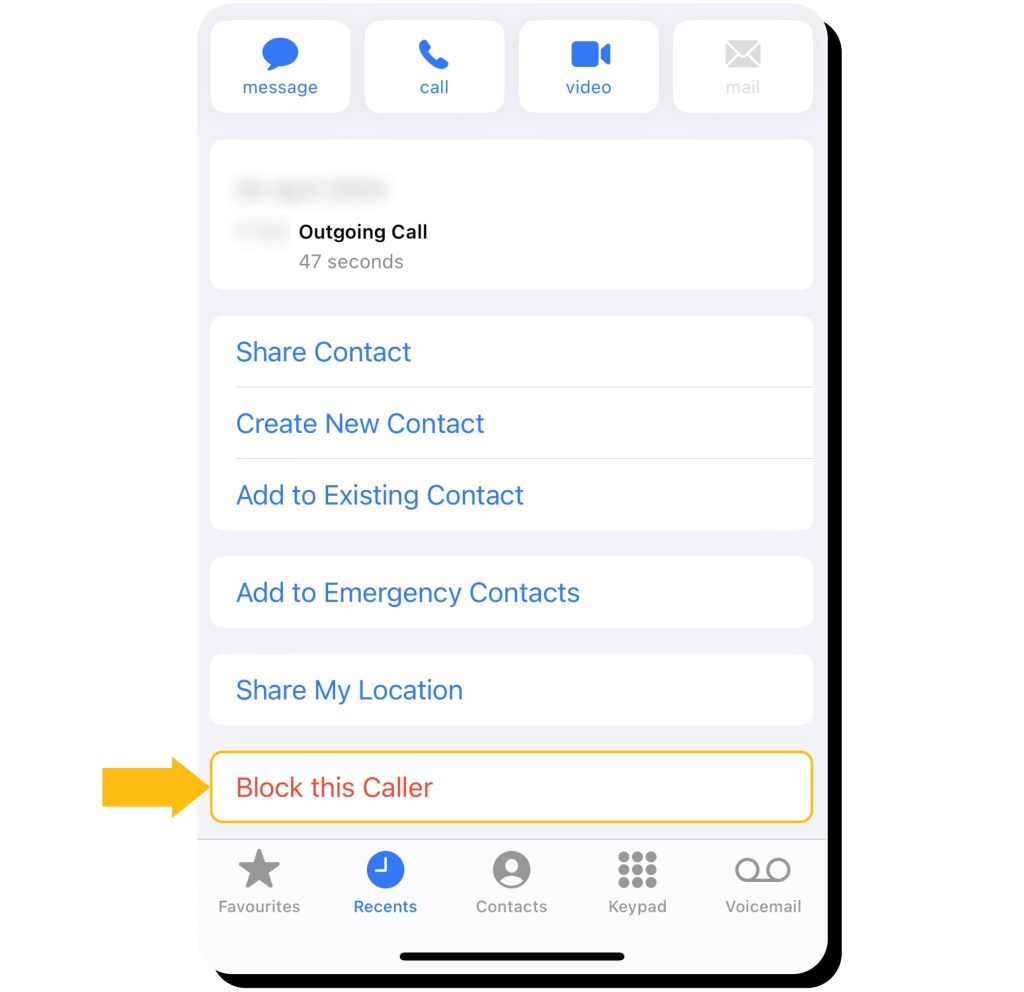
4. Use third-party “stop robocalls” apps
Most carriers and phone manufacturers let users select third-party “stop robocalls” apps. These are really sophisticated programs that make identifying and blocking robocalls easy. In this section, we’re going to talk about a few of the best apps to stop robocalls, spam calls, and spam text messages.
- Nomorobo: Nomorobo is consistently considered one of the best apps to stop robocalls. It even won the Federal Trade Commission’s “FTC Robocall Challenge.” Their landline service is free, but the Android and iOS apps cost $1.99 per month. For top-tier protection, that’s pretty good value. However, there are free alternatives for blocking robocalls too.
- YouMail: YouMail is another great “stop robocalls” app. While its free plan has some limitations, it offers a comprehensive call-blocking service on par with Hiya. The paid plans are a big step up, but the first personal tier costs $5.99 a month. If you’re willing to pay, Nomorobo may be the cheaper and better way to go. Either way, these platforms make blocking robocalls much easier than doing it manually.
- Hiya: Hiya is free, and it’s also considered one of the best call-blocking apps. The streamlined app interface makes it easy to identify calls and block numbers and texts that you want to avoid. It includes useful features like a reverse phone search option for incoming calls, spam alerts, and a call blacklist.

5. Stop robocalls on your landline
If you’re using a landline phone, you can’t do much better than Nomorobo. As the Washington Post covered, services to stop robocalls on landlines typically aren’t as advanced as they are on smartphones. While Nomorobo doesn’t work on copper-based phone lines, it does work on dozens of VoIP carriers (including Verizon Fios, Cox, Comcast Xfinity, and AT&T U-verse). This powerful robocall blocker is completely free for landlines.
6. Sign up for the Do Not Call Registry
One of the easiest steps you can take to stop robocalls is to join the Do Not Call Registry. The FTC oversees the National Do Not Call Registry. It’s completely free to join, and you can add as many numbers as you’d like.
That said, keep in mind that the Do Not Call Registry provides no protection over illegal calls – it’s simply a database that reputable telemarketers use to figure out who should be excluded from their contact list. A phone scammer is already willing to break the law by stealing your information, so they don’t really care if your number is listed or not.
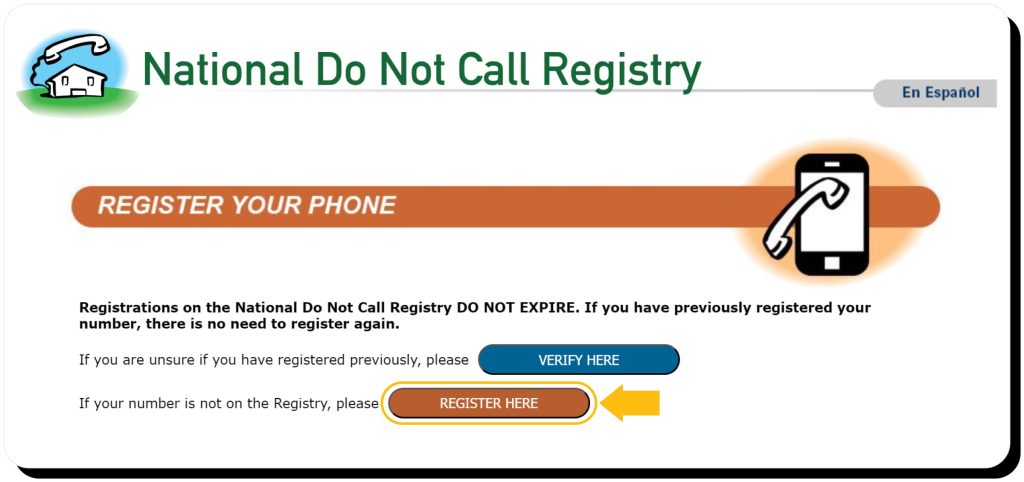
7. Don’t answer suspicious or unknown calls
If you don’t regularly receive calls from unknown numbers, then you can safely assume that a suspicious call isn’t worth your time. We recommend just not picking up any unsolicited calls unless you have a reason to believe they’re legitimate. For more information, read our detailed guide on phone scams.
8. If you pick up, never interact with robocalls or suspicious calls
Scammers love robocalls because they’re really inexpensive and they can run all day, contacting hundreds of people very quickly – they’re trying to see who will be fooled by their imposter call. If you interact with the robocall, then it’s a safe bet that they can further scam you.
By interacting with unsolicited robocalls, you put yourself directly on the radar of more sophisticated scam attempts. This is especially true for robocalls that try to get you to respond “Yes,” entering you into a completely unknown agreement.
9. When in doubt, just hang up and find the official number
If you are truly being contacted by a legitimate business or real person concerning an emergency or update, then there is zero risk in playing it safe. Hang up immediately (without speaking or otherwise interacting), search for the official phone number of that organization, and then ask a representative if the claim is real.
Robocalls are a huge problem, but with the right services, they’re pretty easy to avoid. You just need to know what to look for. By using the best “stop robocalls” apps, utilizing advanced features to filter incoming communications on your cell phone, and learning a few common tricks that robocall scammers use to fool people, you can keep your information safe. For more information on how to stop robocalls, we recommend reading the FCC’s consumer guide.





Mark comes from a strong background in the identity theft protection and consumer credit world, having spent 4 years at Experian, including working on FreeCreditReport and ProtectMyID. He is frequently featured on various media outlets, including MarketWatch, Yahoo News, WTVC, CBS News, and others.